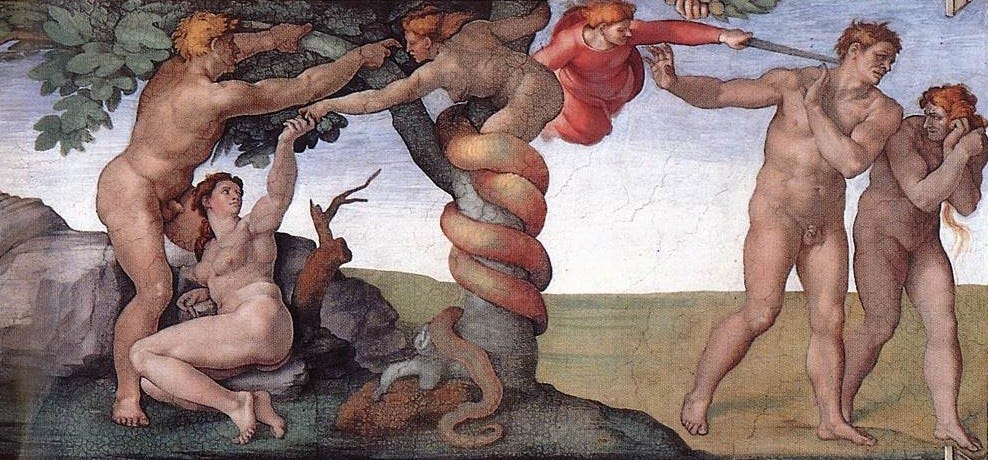Today’s readings once again prove St. Augustine right:
The new is in the old concealed
The old is in the new revealed.Isaiah was written around 700 years before Jesus told his parable. Naturally, as a good Jew, Jesus was familiar with his writings and referred to them when preaching to others who were equally familiar. Still, it’s the juxtaposition of these (and the Psalm) the reveals a deeper understanding God had planned.
Reading 1
Is 55:10-11
Thus says the LORD: Just as from the heavens the rain and snow come down and do not return there till they have watered the earth, making it fertile and fruitful, giving seed to the one who sows and bread to the one who eats, so shall my word be that goes forth from my mouth; my word shall not return to me void, but shall do my will, achieving the end for which I sent it.
At the time Isaiah prophesied this, he was naturally referring to the power of God’s voice; after all, God spoke all of reality into existence.
While that’s true, we interpret it in another way, as well. Jesus is the Word. God the Father sent Him to Earth for the salvation of all mankind. We believe He did not return to Heaven empty-handed, but with a whole harvest of souls.
Now, it’s our job to continue making the world fertile and fruitful.
Responsorial Psalm
Ps 65:10, 11, 12-13, 14
R. The seed that falls on good ground will yield a fruitful harvest.
You have visited the land and watered it;
greatly have you enriched it.
God's watercourses are filled;
you have prepared the grain.
R. The seed that falls on good ground will yield a fruitful harvest.
Thus have you prepared the land: drenching its furrows,
breaking up its clods,
Softening it with showers,
blessing its yield.
R. The seed that falls on good ground will yield a fruitful harvest.
You have crowned the year with your bounty,
and your paths overflow with a rich harvest;
The untilled meadows overflow with it,
and rejoicing clothes the hills.
R. The seed that falls on good ground will yield a fruitful harvest.
The fields are garmented with flocks
and the valleys blanketed with grain.
They shout and sing for joy.
R. The seed that falls on good ground will yield a fruitful harvest.
While Isaiah writes the weather metaphorically, the Psalmist is singing quite literally. We can irrigate the land; we can even reroute rivers. But we can’t make the rain. We can’t fill the rivers.
Every day, farmers see the literal fruits of God’s grace. When you live miles away in the city, like I do, it can be easy to forget that. Which is why we sing songs of thanksgiving like this!
Reading 2
Rom 8:18-23
Brothers and sisters: I consider that the sufferings of this present time are as nothing compared with the glory to be revealed for us. For creation awaits with eager expectation the revelation of the children of God; for creation was made subject to futility, not of its own accord but because of the one who subjected it, in hope that creation itself would be set free from slavery to corruption and share in the glorious freedom of the children of God. We know that all creation is groaning in labor pains even until now; and not only that, but we ourselves, who have the firstfruits of the Spirit, we also groan within ourselves as we wait for adoption, the redemption of our bodies.
God put humans in charge of creation and, well, we kinda screwed up.1
Redemption will entail not only us, but God’s whole creation, as well.
Alleluia
R. Alleluia, alleluia.
The seed is the word of God, Christ is the sower.
All who come to him will have life forever.
R. Alleluia, alleluia.
I’d just like to point out that this particular Alleluia doesn’t come from a specific verse. Jesus is usually identified as “the Word” in scripture; in today’s Gospel, Jesus doesn’t actually specify who the “sower” is.
I’m not going to say the lectionary is wrong, but… this is a weird interpretation.
Gospel
Mt 13:1-23
On that day, Jesus went out of the house and sat down by the sea. Such large crowds gathered around him that he got into a boat and sat down, and the whole crowd stood along the shore. And he spoke to them at length in parables, saying: "A sower went out to sow. And as he sowed, some seed fell on the path, and birds came and ate it up. Some fell on rocky ground, where it had little soil. It sprang up at once because the soil was not deep, and when the sun rose it was scorched, and it withered for lack of roots. Some seed fell among thorns, and the thorns grew up and choked it. But some seed fell on rich soil, and produced fruit, a hundred or sixty or thirtyfold. Whoever has ears ought to hear."
The disciples approached him and said, "Why do you speak to them in parables?"
He said to them in reply, "Because knowledge of the mysteries of the kingdom of heaven has been granted to you, but to them it has not been granted. To anyone who has, more will be given and he will grow rich; from anyone who has not, even what he has will be taken away. This is why I speak to them in parables, because they look but do not see and hear but do not listen or understand. Isaiah's prophecy is fulfilled in them, which says: You shall indeed hear but not understand, you shall indeed look but never see. Gross is the heart of this people, they will hardly hear with their ears, they have closed their eyes, lest they see with their eyes and hear with their ears and understand with their hearts and be converted, and I heal them.
"But blessed are your eyes, because they see, and your ears, because they hear. Amen, I say to you, many prophets and righteous people longed to see what you see but did not see it, and to hear what you hear but did not hear it.
"Hear then the parable of the sower. The seed sown on the path is the one who hears the word of the kingdom without understanding it, and the evil one comes and steals away what was sown in his heart. The seed sown on rocky ground is the one who hears the word and receives it at once with joy. But he has no root and lasts only for a time. When some tribulation or persecution comes because of the word, he immediately falls away. The seed sown among thorns is the one who hears the word, but then worldly anxiety and the lure of riches choke the word and it bears no fruit. But the seed sown on rich soil is the one who hears the word and understands it, who indeed bears fruit and yields a hundred or sixty or thirtyfold."
The short version of today’s Gospel omits Jesus’ explanation of the parable. I suppose that would make the presider’s job easier; he can crib his homily from Christ Himself.
I think it’s interesting, though, to hear Jesus explain things to the disciples. We are, I think, the people Jesus is referring to, who long to see what they see and hear what they hear. This is our chance to listen in (at a distance of a couple thousand years).
Given this opportunity, let’s incline our ears to hear the Word.
That painting is a reproduction of the Sistine Chapel.




